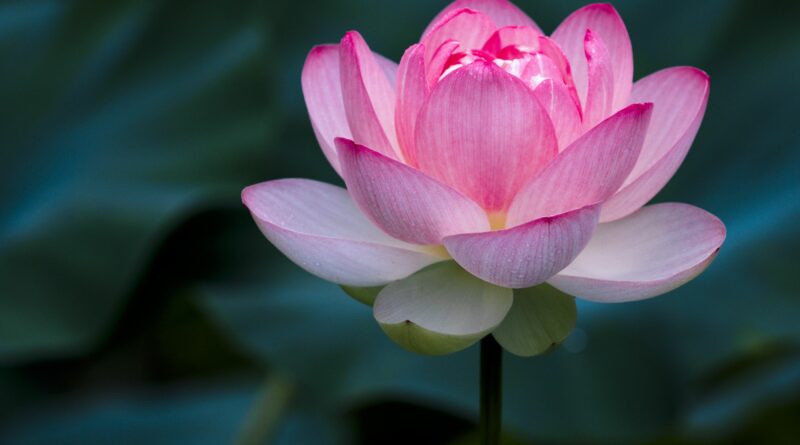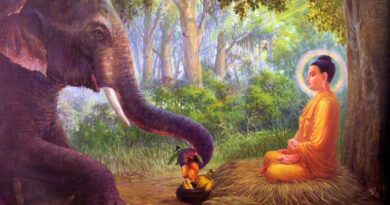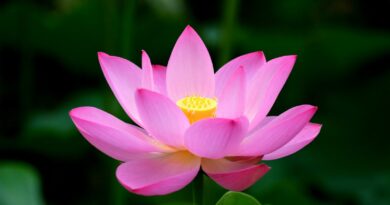Vipassana Is Optimism, Realism And Workism
A mother sends her young son to the local grocery store to buy cooking oil. She gives him an empty bottle and a ten-rupee note. He buys the oil and has the bottle filled. On his way back, out of carelessness he falls, drops the bottle, and spills half the oil. Picking up the half-empty bottle, he comes home crying: ‘Oh, mother, I lost half the oil! I lost half the oil!’ A very pessimistic boy.
The mother sends another son, with another empty bottle and another ten-rupee note. He also buys the oil, and has the bottle filled. He also falls, drops the bottle, and spills half the oil. This boy picks up the bottle and goes to his mother, happy and smiling: ‘Look! I saved half the oil! I fell down so the bottle might have broken and I might have lost all the oil. Look, half the oil is saved!’
It is the same situation, but each boy has responded quite differently. One boy is pessimistic, crying that his bottle is half empty. The other boy is optimistic, happy that at least his bottle is still half full.
The mother sends a third son. He also falls, drops the bottle, and spills half the oil. Like the second boy, he comes smiling, saying: ‘I saved half the oil.’
But this boy is a Vipassana boy. He is not only optimistic, but also realistic: ‘The truth is that I have lost half the oil; my bottle is half-empty.’ He is not only realistic, but also a real worker, as in Vipassana! He decides to work hard and earn five rupees to fill the bottle by the evening. Dhamma is not merely optimism. It is also realism and also ‘workism’.
Each individual has to work, always remaining optimistic. There is not a trace of pessimism in Dhamma. It is all optimism. There is misery—half of the bottle is empty: you have to accept that. Now how to fill it? You have a path now to come out of the misery. Make use of it, and this is what you have started doing. You are realizing the truth. It is not merely an intellectual exercise, an emotional or devotional acceptance of the truth of misery and the way out of misery. You are experiencing it.
When you work with sensations, you are directly experiencing the truth. It is your own living wisdom, not a borrowed wisdom from somebody else. This whole process of observing sensations helps you understand because you are giving importance to your own experience of the truth within the framework of the body.
Otherwise, throughout life, you keep giving importance to objects outside and craving for them. They have become so predominant that you forget that you are craving for them. You also forget that by craving, you lose the balance of your mind, and become very miserable.
You have to understand how you have become addicted to this craving. If there is a natural requirement, for instance, you are thirsty and you want water, there is nothing wrong; you work hard to get water to quench your thirst. Perhaps you tried and you didn’t get water; you just smile and keep trying. You don’t lose the balance of your mind.
However if you start craving for water, then you have lost the balance of your mind. You start worrying: ‘What will happen? Will I die if I don’t get water?’ You become so agitated; you become so miserable. You are not observing the process inside. Water is secondary compared to your craving. Even your craving is secondary compared to the misery it brings.
The moment that you start craving for something, this means you that you are discontented, dissatisfied with what is. You want something which is not. Because it is not, you become very miserable. Once you have realised that you are becoming miserable, then there is a way out. When you don’t realise it, you get overpowered by the misery of the craving and without even knowing it, you become addicted to craving. This only intensifies it and makes the situation far worse.
When you start observing sensations, a stage will come sooner or later, where you will understand that you are actually not craving for any object. You are craving for a particular sensation. When you crave for anything, a sensation arises. When that craving is fulfilled, the sensation ceases but you want that sensation again, so you have to crave for something else. Each time the object is attained it becomes stale. Each time your craving is fulfilled, you want something else. You have become addicted to this craving.
For example someone lives quite happily in a small one-bedroom cottage. Suddenly the thought comes to his mind that it is too small. He must have a big house with at least three bedrooms. So he acquires a three-bedroom house. Now it must be beautifully furnished in the latest style. He furnishes it and then that becomes stale. Now he must equip it with the latest equipment: a colour TV, a washing machine, all the most sophisticated electronic systems—the whole house is filled with machines. Yet there is no satisfaction because he keeps craving.
He has an ordinary car but now it seems just a rust heap! Now he must have a new model, say a Toyota. Once the Toyota arrives, he doesn’t want it. It must be a BMW. Even that is not good enough. It must be a Mercedes Benz, then a Rolls Royce. Even that is not good enough.
Other people have their own helicopters, so he must also have one. Then he must have his own airplane. Now he needs a spacecraft to go to the moon. Even this becomes stale. Now he must have a spacecraft to go to Mars or to some other planet or to a different galaxy!
Even the sky is not the limit: craving is a bottomless bucket which can never be filled because the addiction is to the craving, not to the object. It is craving for the sake of craving, and this makes the situation far worse. This is what happens. As you proceed on the path, it will become so clear.
When someone is described as being addicted to alcohol or drugs, it only appears so at the surface level. Actually the addiction is to the sensation. When he takes a drink, the alcoholic feels a certain sensation, and he wants that sensation over and over again. So he has to take alcohol again and again. Similarly a drug user has to take the drug again and again. The sensation is so important.
This was the Buddha’s discovery. Unless you learn how to observe your sensation, you cannot come out of any addiction. Addiction to alcohol and drugs is nothing compared to your addiction to craving and aversion. There are so many impurities of the mind, and you are addicted to all of them. You keep repeating them again and again because you are addicted to a particular type of sensation. You want that sensation again and again, so you keep generating certain impurities to get that sensation. This has become the habit pattern of the mind. How to end it?
There is misery but there is also a way out of misery. You learn how to observe the misery, without reacting. Whatever is happening, you are a silent witness. You are like a person sitting at the bank of the river and watching it flowing. You have to do nothing about it; the river just flows naturally. Sitting at the bank, you just observe. Similarly, you feel a flow of vibration, of sensation, throughout the body.
You observe it like a scientist in a research laboratory. A liquid chemical is heated in a glass tube and some of this volatile matter evaporates. It passes into another tube, where it condenses and re-emerges again as liquid. The scientist just observes. When the liquid evaporates, he doesn’t start mourning for the loss of his chemical. When it again liquefies, he doesn’t start celebrating; he just understands the process. Yet all this scientific understanding is only at the intellectual level. He is not experiencing it.
Here you are experiencing the form and function of the entire physical and mental structure; the combination of the two; the interaction between the two. You experience how each influences the other; how matter causes mind to originate and how mind causes matter to originate. At times, it seems as if matter is changing into mind. At other times it seems as if the mind is changing into matter.
When you experience all this, it makes so much difference. The wisdom that you gain is your own wisdom. It is not just an acceptance of the Buddha’s words or your teacher’s words or some passage in the scriptures. This truth is a universal law of nature, which has nothing to do with any organized religion. This universal, natural law will become clearer and clearer if you keep working.
It was so in the past, it is so now, it will be so in the future. It is so whether or not a Buddha is present. As the Buddha said, whether an enlightened person is present or not, the law of nature remains the same; it is eternal. Negativity always brings suffering, and the eradication of negativity always brings liberation from suffering.
Source: https://www.vridhamma.org







